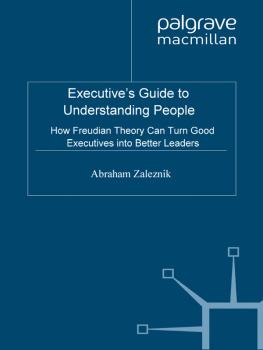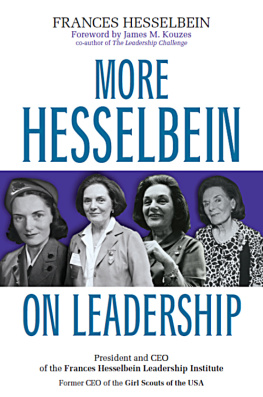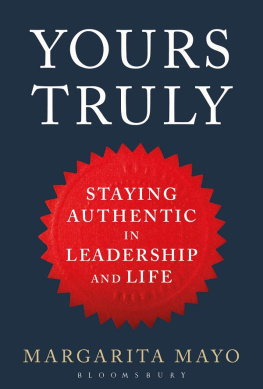EXECUTIVES GUIDE TO UNDERSTANDING PEOPLE
EXECUTIVES GUIDE TO UNDERSTANDING PEOPLE
HOW FREUDIAN THEORY CAN TURN GOOD EXECUTIVES INTO BETTER LEADERS
Revised Edition
Abraham Zaleznik


EXECUTIVES GUIDE TO UNDERSTANDING PEOPLE
Copyright Abraham Zaleznik, 1990, 2009.
All rights reserved.
First edition published as Executives Guide to Motivating People in 1990 by Bonus Books, Inc.
This edition first published in 2009 by PALGRAVE MACMILLAN in the United States - a division of St. Martins Press LLC, 175 Fifth Avenue, New York, NY 10010.
Where this book is distributed in the UK, Europe and the rest of the world, this is by Palgrave Macmillan, a division of Macmillan Publishers Limited, registered in England, company number 785998, of Houndmills, Basingstoke, Hampshire RG21 6XS.
Palgrave Macmillan is the global academic imprint of the above companies and has companies and representatives throughout the world.
Palgrave and Macmillan are registered trademarks in the United States,
the United Kingdom, Europe and other countries.
ISBN: 978-0-230-61569-4
Library of Congress Cataloging-in-Publication Data.
Zaleznik, Abraham, 1924
Executives guide to understanding people : how Freudian theory can turn good
executives into better leaders / Abraham Zaleznik.
p. cm.
Includes bibliographical references and index.
ISBN 978-0-230-61569-4
1. LeadershipPsychological aspects. 2. MotivationPsychological aspects. I.
Title.
BF637.L4Z35 2009
658.4092019dc22
2009006796
A catalogue record of the book is available from the British Library.
Design by Macmillan Publishing Solutions.
First PALGRAVE MACMILLAN edition: November 2009
10 9 8 7 6 5 4 3 2 1
Printed in the United States of America.
LIST OF FIGURES
PREFACE
Dear Reader,
You probably bought this book because you are interested in motivating people. Any executive, or aspiring executive, should be concerned about what makes people tick and how to get them keenly interested in their jobs, their companies, and their work associates. But as with all practical questions, you have to do a lot of work before youre in a position to affect how people think and feel.
The first thing you have to do is get a better handle on your own motivation. The more you know and understand yourself, the more you will be able to know and understand other people. When I say get a better handle on your own motivation, I am referring at the outset to the ideas you already have. In a sense, we are all experts when it comes to figuring out what drives people to act the way they do. The trouble is that mixed in with good common sense are a lot of false ideas, wrong assumptions, and wishful thinking.
Let me give you an illustration. Most executives hold as a fixed truth that if you set a clear goal, show people how to achieve that goal, establish an incentive, and reward them if they meet the goal, you have a surefire method for motivating people. This theory of motivation comes from behavioral psychology. Much evidence supports it, which is probably why executives believe it and texts on management espouse it. The problem with this theory is that it oversimplifies and leaves out crucial elements. For example, does an employees relationship with his or her supervisor have a bearing on how the employee perceives the goal, the path, and the incentive? Does this perception have an effect on the employees attitude and willingness to accept the goal and work toward attaining it?
People have a habit of loading meaning on to their own experience. What happened in the past and the inferences attached to past experience determine how people look at themselves and other people, particularly authority figures. Therefore, simply fixing a goal and providing incentives reverberates with the history that is condensed in the relationship between the person who is talking and the one who is listening. You can choose to ignore this history, and sometimes it is wise to do so, but you should be aware of what you are doing and why. In my experience, its what you dont know that will hurt you. The stronger your grasp on the human condition, the wiser you will become in the human dimension of your job as an executive.
In no way is this book intended as a self-help or personal therapy book. I dont believe such books are very useful, although at times they seem to provide comfort for people in a quandary. Nor will I present material on the techniques of more formal therapy. It was never my intention to try to make executives into psychoanalysts. In fact I have cautioned my students, and caution my readers, that interpreting someone elses motives, conscious and unconscious, is poor practice in everyday life. Psychoanalytic therapy is a specialty requiring expert training and is used selectively for patients who can benefit from the treatment. But psychoanalytic psychology is available for general enlightenment and, in this case, for executives who are taking responsibility for the use of power in human relationships.
I wrote this book for my students in the MBA program at the Harvard Business School. Originally called Social Psychology of Management and more recently, the Psychodynamics of Leadership, this course introduced MBA candidates to Sigmund Freuds theories of the mind. His was a depth psychology that established the importance of unconscious motivation in human behavior.
Over many years of teaching, I have included various introductions to psychoanalysis among the course materials. Most of these introductions assume that the reader is a mental health professional or has some interest in clinical practice. I found that business school students need a somewhat different introduction. So I wrote this book, trying to keep the perspective of a curious, if not skeptical, executive who wants to learn about people, but is not especially interested in the problems of mental health, let alone the difficulties in curing mental illness. I concentrated on what we have learned from psychoanalysis and not on how this knowledge is revealed, and also examined, on the clinicians couch.
You will read in this book about transference and may wonder if it was wise to avoid the clinical perspective. Briefly, transference occurs when a person experiences in the present some aspects of a relationship with a figure from his or her past. Authority figures are natural targets for transferences of unconscious ideas and emotions from the history of ones relationship to ones parents. Transference is an important discovery straight out of the clinical situation. In fact it is the lever that makes it possible to undo many of the adverse effects of past experience on character, perceptions, and behavior. I do not dwell on the clinical aspects of transference in this book. Instead, I try to show how transference occurs in everyday life and how it affects human relations in organizations. In connection with that thought, let me tell you about the variety of ways we learn about unconscious motivation other than in the clinical situation.
Most of what we learn in life comes on an installment plan, a piece at a time. I have encountered a few executives and even some students who seem to have a natural gift for understanding the human condition. This gift extends to the ability to sense aspects of unconscious motivation in self and others. Such people appear to be sensitive to the idea that dreams mean something beyond their manifest content, they realize that defenses are a part of everyones psychological makeup, and they understand deep desires, fears, and the more apparent reactions of greed and envy as these voracious affects permeate human relationships.
Next page








